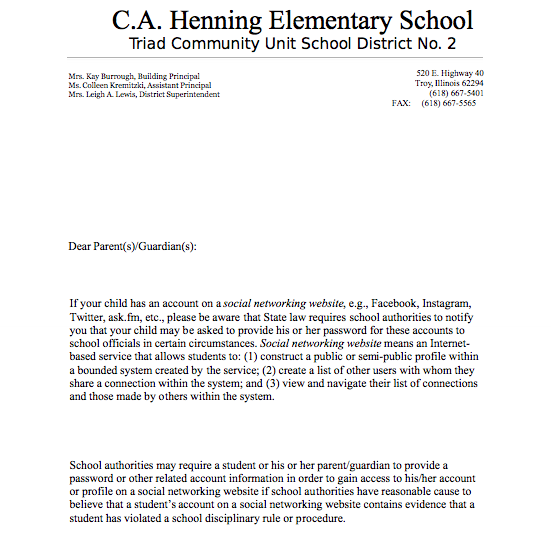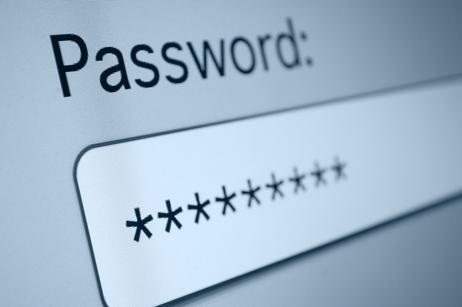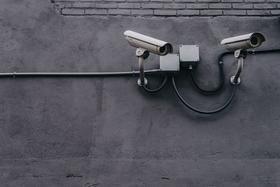It is a story that is all too often in the news: A child is subjected to torturous cyberbullying by his or her peers via social media. Threatening messages sent on Facebook, humiliating comments about their appearance on Twitter, and other such nonsense drives the student to lash out, possibly hurting themselves, their peers, or both.
Schools no doubt serve a protective function and are charged with ensuring students have access to a free, appropriate education in an environment that is safe, secure, and nurturing. To help achieve that end, some states are taking strong measures to bolster the authority and power of school districts with regard to investigating instances of bullying, even if such negative behaviors do not occur on school property or within the bounds of the school day.
The Illinois Law
In an attempt to curb cyberbullying behaviors, the Illinois General Assembly passed a law, enacted January 1st of this year, that allows public school districts to demand access to students’ personal social media accounts if the student is suspected of violating school rules.
A letter sent home to parents in Triad Community Schools in Illinois, obtained by Motherboard, outlines the new policy:

“School authorities may require a student or his or her parent/guardian to provide a password or other related account information in order to gain access to his/her account profile on a social networking website if school authorities have reasonable cause to believe that a student’s account on a social networking site contains evidence that a student has violated a school disciplinary rule or procedure.”
Leigh Lewis, the superintendent of Triad Community Schools, clarified the parent letter by saying that the district understands privacy concerns and that school officials “will not haphazardly request social media passwords unless there is a need.” Lewis also asserted that should a situation arise, parents would be involved in the process.
Lawmakers and state education officials drafted the law because of the potential impact that online threats – made at school, at home or otherwise – have on the school environment. In the past, students have by and large voluntarily complied with requests by school personnel to examine the contents of their social media accounts when problems arose. However, in an effort to ensure their ability to step in when needed, lawmakers gave school officials the power to demand students’ passwords.
Parents Voice Concerns
Privacy is a tricky issue when it comes to children. On the one hand, parents strive to strike a balance between being nosy and overprotective with being engaged with their children and protecting them from harm. This issue becomes even trickier when outside forces attempt to peer into a child’s private life, even if those forces mean well.
Part of the uproar over the Illinois law is that it is so wide in scope. One might assume that the law would apply only to incidents that occur using school-owned and operated equipment or that occur during the course of the regular school day on school property.

Falling into this category might be a nasty text sent from one student to another using their cell phone while connected to the school’s Wi-Fi network, or utilizing school computers to harass another student via Twitter, Instagram, or another social media platform.
This, however, is not the case.
Instead, the Illinois law allows school officials to ask for student passwords and search their social media accounts regardless of when the alleged incident took place. Any posting, made at any time, at any place, can be the subject of a school inquiry. In short, school officials can demand access to a child’s social media accounts for something they allegedly said off school grounds or posted while in their bedroom at home.
Another point of contention for parents is that the law, which is intended to reduce the incidence of cyberbullying, seems to imply that school officials are within their rights to ask for a student’s password in any situation in which children are suspected of violating school rules. The question then becomes, if a child gets in trouble for being tardy to class or for using inappropriate language, does the school get to browse through that child’s social media accounts to see what else he or she has been up to?
The answer to that question seems to be unknown.
Also unknown is the extent to which school districts can go if a student refuses to supply their passwords. Superintendent Lewis says that schools could potentially press charges if a student refuses to cooperate. In statements made to Motherboard, the Superintendent affirmed that “I would imagine that turning it [the case] over to the police would certainly be one way to go. If they [the student] didn’t turn over the password, we would call our district attorneys because they would be in violation of the law.”
The effort to protect children from harassment by their peers is certainly admirable, but many parents don’t appreciate the threatening tone of the superintendent’s message or the prospect that their child might be prosecuted for refusing to hand over personal information.
In an effort to alleviate concerns, school districts have tried to reassure parents that the power to search would be used only when “reasonable cause” is present. However, what exactly constitutes reasonable cause and who gets to determine whether that threshold has been met, is somewhat unclear.
In an interview with local news, one parent, Sarah Bogart, said that while it is justifiable for her to access her child’s personal accounts, to “have to hand over your password and personal information is not acceptable to me.” Instead, Ms. Bogart suggested that parents be called in to access their child’s accounts and give consent to the school to read those contents.
Past Student Privacy Rights Issues
The question of the extent to which students can expect privacy while at school has been one debated for decades. While schools are not Constitutional abysses in which children have no rights at all, children also do not have the same legal protections as they might have elsewhere.
Case in point: In 1985, the Supreme Court ruled in New Jersey v. TLO that while at school, students must balance their expectation of privacy with the need of administrators and other school personnel to maintain a safe learning environment. The Court’s decision also developed a standard for searches of students by school personnel:
- While the Fourth Amendment protects students from unreasonable searches, schools are not required to obtain a search warrant to search a student that is under their control.
- Searches can be initiated if there is “reasonable suspicion,” which is a far lower standard than probable cause, which governs the legality of a search as part of a criminal investigation.
- If a student has no legitimate expectation of privacy (i.e. he or she screams a threat to a teacher), the Fourth Amendment does not restrict searches by school personnel.
But what New Jersey v. TLO also established is that students have a legitimate and reasonable expectation of privacy when it comes to items on their person and in purses, wallets, and backpacks. Naturally, the Justices had no concept of cell phones being carried by children in their pants pockets back in 1985, but some argue that this precedent covers that exact scenario today.
In the years since the TLO decision, school districts have come under fire for what parents – and some courts – have called an overreach of authority, particularly when it comes to student activity on social media and the school’s attempts to regulate students’ postings:
- In 2014, a student was awarded a $70,000 settlement after a public school district forced her to provide them access to her Facebook account.
- In 2014, an Alabama school district was scrutinized for employing a security firm to monitor the online activity of students, including their social media posts.
- In 2013, a California school district was forced to abandon part a policy that allowed coaches to suspend their athletes for making undesirable posts on social media after students and parents staged a protest.
- In 2013, another California school district was criticized for paying an outside company to monitor the social media activity of students. In response, California Governor Jerry Brown signed a law limiting such practices, which includes a provision that requires parental notification of programs that seek to glean information from students’ personal accounts.
Legality of Illinois Law Called Into Question
Concerning the legislative action in Illinois, some legal experts have joined parents and students in voicing concerns about the constitutionality of the new law. Even the general counsel to the Illinois Principals Association (IPA) has voiced concern over the matter, stating that “we [IPA] don’t think this is a good procedure” and that the IPA is “not in favor of the legislation.”
Brought into question is whether the law violates the free speech protection of the First Amendment. Of additional concern is a child’s expectation of protection from unlawful searches and seizures, although that expectation of privacy was limited by New Jersey v. TLO.
Perhaps most concerning for those involved is the notion of a “slippery slope.” While searching a student’s social media accounts for evidence of bullying, what happens if they also uncover evidence that the student’s mother is involved in some kind of illegal activity?
Figuring out where to draw that line will be a difficult task for schools in Illinois, but a necessary one. According to some legal experts, policies regarding student social media accounts must be incredibly cautious because as schools get into the business of monitoring online student activities, districts could potentially be on the hook for liability for the things they see.
Legislative Action Around the Country
School districts across the nation are taking action on issues related to student privacy at school in order to avoid the slippery slope situation described above.
In Utah, Michigan, Louisiana, Rhode Island, and Maine, state lawmakers have enacted statutes that limit the power of schools to access students’ social media accounts. In some cases, these laws expressly prohibit educational institutions from even requesting a student’s password, let alone access their social media accounts. Hawaii, Ohio, New Hampshire, and Indiana have laws on the books that forbid schools from collecting social media information at all. Fully 28 additional states have current or proposed legislation that seek to protect social media information in an employment setting, which could soon extend to public schools as well.
What Parents Can Do
If you’re concerned about your child’s right to privacy at school, educating yourself about school district policies is a good first step. Many school boards post their policies online for easy access, although the legal jargon sometimes used in such policies can be confusing. Student handbooks are another great resource for finding information about all school policies, not just those related to viewing students’ private information.
Another option is to contact the principal at your child’s school to inquire about what – if any – policies are in place regarding school access to students’ social media information. If such policies are in place, be sure to ask clarifying questions so you understand exactly what the policy entails. Possible questions to ask include:
- Is my child required to comply with requests for his or her login and password, or is the school simply allowed to request access?
- If my child does not comply, then what?
- At what point will I be notified that my child is being asked to hand over private information?
- What happens if, during the course of examining my child’s social media information, evidence is found that my child has done something wrong unrelated to the original inquiry?
At the end of the day, school officials are not trying to create an environment like that in George Orwell’s Nineteen Eighty-Four. They are attempting to ensure that children are protected from hate and harm. Perhaps the way that Illinois has gone about this endeavor is not the most appropriate. However, if parents seek out the information they need to be informed about such policies and school districts open dialogue with parents and students, school will be a much more productive, caring, and safe place in which children can learn and grow.














